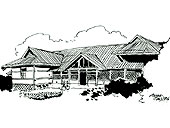 |
On the northeastern side of the Dighali Pukhuri stands an old bungalow, which was the centre of Guwahati’s socio-cultural life in the first quarter of the 20th century. The Brahmaputra flowed in front of bungalow, while chirping birds and butterflies added to the charm of the place. The cool breeze of the Barluit kissed every nook and corner of the bungalow. In this bungalow lived a desi saheb — Jnanadabhiram Barooah.
The first law college of the Northeast, the Earle Law College, was established in 1914. Jnanadabhiram Barooah, bar-at-law, who was serving as the extra assistant commissioner (EAC) and munsiff of Guwahati, was appointed its first principal. Though, initially, the classes of the newly-established Law College were held on the Cotton College premises, soon a big plot of land was acquired from a person named Petua for the construction of the college building and the principal’s residence. It was a plot of land on the northeastern side of the Dighali Pukhuri.
The Assam government had a budgetary sanction of Rs 63,000 to cover the cost of the land, the first phase of the building and the principal’s residence. The construction was completed in 1915. The principal’s bungalow was a spacious one, facing the college with a huge lawn and garden in front of it.
Barooah, founder principal of the college, became the first occupant of the residence, which was destined to become the centre of many creative activities in future. To the commoners it came to be known as Barooah Sahabar bongla; to the intellectuals of the period it was Jnan Barooahar howli.
Barooah had a towering personality. The youngest Assamese to travel to England at the age of 16 to study law at Grey College, Jnanadabhiram became a legendary figure in Assam during his lifetime. Naturally, his official residence became a hub of multifarious activities — academic, literary and cultural. Kamalakanta Bhattacharyya, Chandra Kumar Agarwalla, Hem Chandra Goswami, Tarun Ram Phookan and Benudhar Sarmah were frequent visitors to this bungalow.
The bungalow was witness to many historical events. Jyotiprasad Agarwalla visited the bungalow several times while making the first Assamese film, Joymoti. Barooah not only acted in Jyotiprasad’s next film, Indramalati, its scripts were read out in this very house before they were finalised. Though there were suggestions that some scenes for Indramalati be shot in this bungalow, the idea was abandoned as it was a government building.
However, Barooah’s personal chair and electric table fan were used for the sets of the movie. Barooah was also chief patron of the Earle Law College drama club and he personally supervised the rehearsals, which were held on the lawns of this bungalow. A.E. Brown, professor of history, Cotton College, who also taught at Law College, spent many evenings in Barooah’s bungalow to learn Assamese and rehearse for the Assamese drama, Hemaprabha, in which he played the role of David Scot at the request of Barooah.
Though a British government servant and a sahib in appearance and attire, Barooah was a fearless swadeshi at heart. He was possibly the only Assamese who dared to arrange a jatra by the famous nationalist singer of Bengal, Mukunda Das. This programme was arranged on the lawn of his official residence where he invited some British officials, including one Bentinck.
A large group of citizens and students had gathered to watch the performance. When Mukunda Das sang Bande Mataram, Bentinck was the first person to stand up and show respect. All others, including the leading citizens and the students, followed Bentinck.
Next day, when Barooah was taking a class, he pointed to the bungalow lawn and asked the students: “What lesson did you learn from Bentinck last evening?” When no one replied, Barooah explained: “Bentincks’s standing up immediately when Bande Mataram was being sung reflects the liberated mindset of citizens of an independent nation, while the belated response of the locals exhibits the bonded nature of a subjugated nation.”
This bungalow gave shelter to Lakshminath Bezbaruah several times. It was in this bungalow that Rabindranath Tagore stayed for three days from October 31 to November 2 in 1919 as the guest of Jnanadabhiram Barooah. People from different parts of Assam came to meet Tagore in this house. Ambikagiri Roychowdhury sang a borgeet for Tagore in this bungalow at the latter’s request. Acharya Prafulla Chandra Roy and Sir Ashutosh Mukherjee also stayed in this bungalow.
Jnan Barooahar howli or J. Barooah’s bungalow became the most frequented place of the who’s who of Assam’s socio-cultural life. Littérateur Atul Chandra Hazarika made an interesting observation when he wrote: “J. Barooah’s bungalow became the haunt of the insurance agents as many people used to visit this bungalow.”
It was in this bungalow that J. Barooah wrote a number of books, which included Folktales of Assam, Mor Katha and Anandanandar Katha.
Later, when Gauhati University was established, some classes were held on the Law College premises. Gopinath Bardoloi, Birinchi Kumar Baruah and many other luminaries visited the bungalow, which was used as the office of the secretary of Gauhati University at that time. Later, it was used as the office of the inspector of schools of lower Assam.
Now, this great heritage of Assam is the official residence of the superintendent of Nalinibala Devi Girls’ Hostel of Cotton College.











